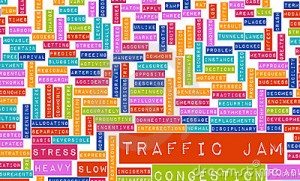Will Carriers Pull the Trigger on Congestion Surcharges?
Though they have not yet imposed them, most carriers have prefiled congestion surcharges with the Federal Maritime Commission.
As congestion continues at West Coast ports, there is growing anxiety among shippers about whether carriers may chose to “pull the trigger” on congestion surcharges that they filed this spring with the Federal Maritime Commission.
An important lobbyist in Washington for shipper groups such as the Agriculture Transportation Coalition and Coalition of New England Companies for Trade, Peter Friedmann, said, “I’m getting calls from shippers wondering if the carriers still have their tariff on file to impose these disruption penalties.”
Most carriers “forward filed” congestion tariffs with the Federal Maritime Commission in the spring. In most cases, these amount to $1,000 for a 40-foot container. A typical notice from a carrier — in this case Maersk Line — warned customers “that in the event there is congestion, causing significant disruption to our normal operations, this surcharge will be applied to all shipments destined for or originating in the United States (including those shipments transiting through Canada or Mexico).”
Friedmann and Sri Laxmana, the director of ocean services at C.H. Robinson, which says it is the largest NVOCC on the eastbound trade from China, were not aware of any carriers who have yet said they will impose the congestion charges. But with the congestion worsening in the past week and a half, and worker slowdowns in Tacoma and Washington, liner companies have discussed what conditions might trigger imposing the surcharges during meetings of the Transpacific Stabilization Agreement, a discussion agreement that includes 15 major carriers in the trade between Asia and the U.S.
Decisions to use the congestion surcharges would be made individually by lines, not collectively by the TSA members. In a press release issued on Monday, the International Longshore and Warehouse Union said employers, represented by the Pacific Maritime Association had “deceptively” blamed its members for port congestion caused by chassis mismanagement and other supply chain failures.

“The ILWU is not responsible for the ongoing congestion crisis at West Coast ports,” the union said.
“The numerous, non-labor related causes of the congestion problem up and down the West Coast are well documented,” said ILWU spokesperson Craig Merrilees. “During negotiations last week, the union addressed PMA directly to express concerns about its deceitful media tactics and the corrosive impact of such tactics on collective bargaining. It’s particularly inflammatory for workers to be told that they’re using safety as a gimmick.”
Merrilees said safety concerns were behind a disruption at a terminal in Oakland over the weekend. When a part fell off of a piece of cargo-handling equipment, workers insisted that machinery be inspected. The port said operations appeared to be back to normal on Monday.
The PMA and the ILWU continued contract talks over the weekend and on Monday.
The ILWU said PMA press releases that have accused it of threatening “to stem the flow of cargo during the final holiday season push” obscures “months of data regarding the non-labor related causes of the current crisis-level congestion problem.”
The ILWU said, instead, that congestion is being caused by shortages and the dislocation of chassis; rail service delays, including a national shortage of rail cars (the ocean carrier Hamburg-Sud said in a bulletin to customers that on Friday both the Burlington Northern and Union Pacific Railroads issued embargoes on all westbound container traffic to Tacoma and Seattle); “exodus of truck drivers who cannot make a living wage;” and long truck turn times. They also point to the increase in retail import volumes of 5.3 percent over 2013; larger vessels discharging massive amounts of cargo; container terminals pushed to storage capacities; and the peak shipping season.
In Los Angeles, it noted a Sept. 23 fire in the Port of Los Angeles temporarily closed three of six cargo terminals, “causing delays in the movement of cargo that reverberated down the supply chain.”
The ILWU also said there is a “major shortage of longshore workers and marine clerks.” The union said, “Despite ILWU demands, PMA repeatedly refused to increase the size of the full-time workforce prior to the start of negotiations.”
